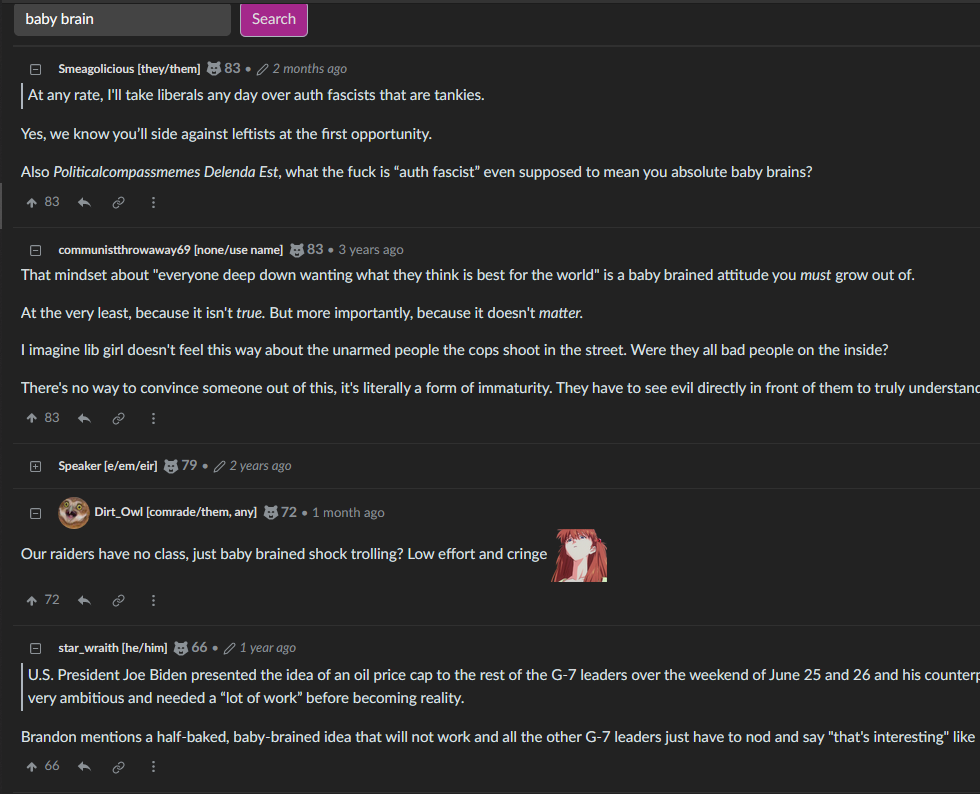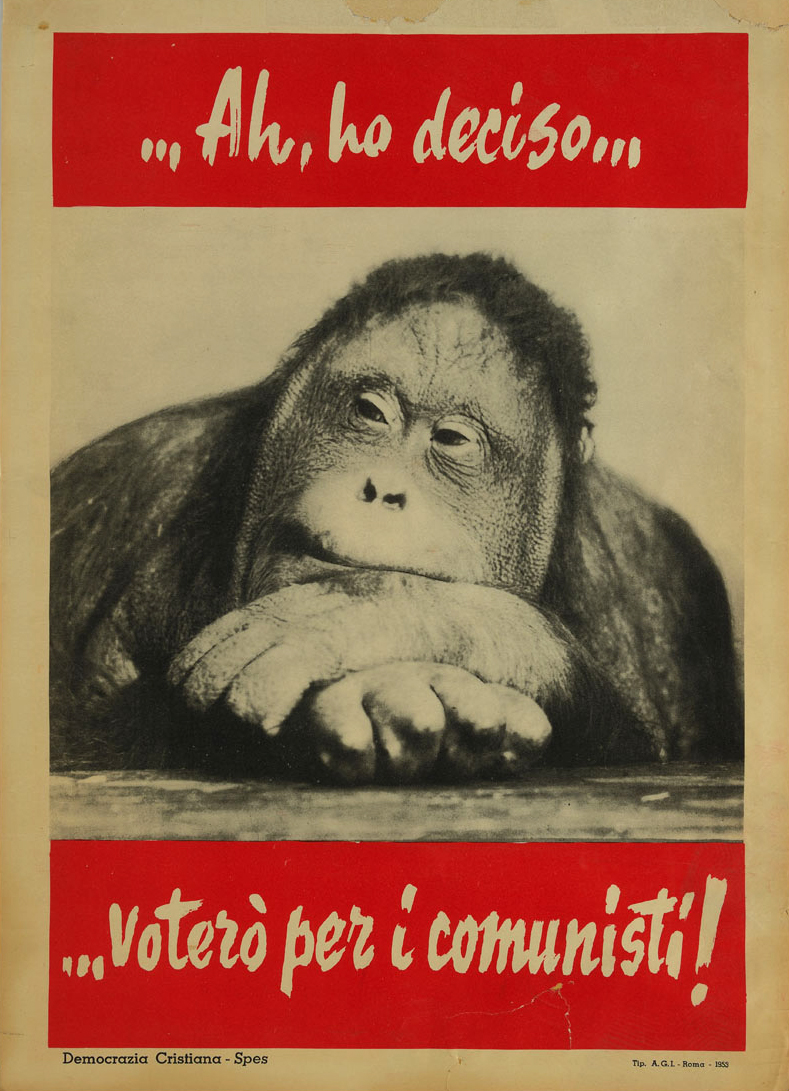One part Great Man Theory with tons of navel gazing and genuflecting to a handful of star figures. One part Sorkin-esque courtroom drama.
Zero parts fun.
Three fucking hours long.
Don't waste your money on this shit bag, folks.
I'm starting to realize everyone on this site has baby brain movie opinions
I think it’s a maturity thing. There’s an outward need to be contrarian, to be seen. And often just yeah baby brained poor analysis of film
My treats are actually really cool and underground you probably haven't heard of them because you're not cool like me
I don’t think it’s a commentary of the maturity of the treats. I think it’s going out of your way to say that there is zero value or anything interesting in a movie like Oppenheimer is just reductive and silly. It just speaks to having a pretty unrefined sense of film analysis. Notice here I’m not arguing for the merits of Oppenheimer. There’s often a sort of weird desire to compete with one another in left spaces to be more radical than others, like “oh that’s your opinion? My opinion is even more extreme than that. I win.” Which leaks into conversations like this in weird ways, and I think that’s a generally a of personal immaturity, not the maturity of the thing itself. And also, “baby brained” is just colloquial shorthand. It’s a silly little phrase, but it’s kind of straw man to be like “oh you used a widespread internet phrase, who’s the immature one now?”
Yeah that’s obvious. I’m asking you what you’re implying with the “unless” because their comment doesn’t extend beyond just being tongue in cheek. If you’re tired, we can leave it. Honestly none of this matters
idk, I think calling things "baby brain" is an indicator of lacking maturity to a greater extent. Yeah young people can be reactant, but eh . . .
Only starting to realise now? This site has had the weirdest most out of touch opinions I've ever seen on general media. Like a bunch of millenial boomers. My favourite occurrence of this is when hexbear starts trashing on movies like black panther, saying it's colonialist/racist or something. Well in South Africa where I live, people absolutely love that movie series, black panther is massive over here. I'm talking about singing and dancing outside the cinema, holding watch parties, etc. I've yet to meet a single African here that has expressed a negative opinion of the movie in real life. Pretty much everyone under the age of 35 loves it and regularly makes jokes about "Wakanda", etc. Yet according to hexbear it's colonialist apologa trash that no one likes.
There also seem to be a bunch of cranky joyless users that hold eternal grudges bazinga style, like Sheldon Cooper from the big bang theory lmao. I don't quite understand that.
I liked black panther, but it portrayed CIA martin freeman as a core good guy for no particular reason which is not good.
I'd absolutely agree that vocal users this site as a whole will often will take a criticism of a movie like that and sprint with it to make it the center of their opinion of the entire movie (which sometimes they haven't even seen)
The day I take any of the rando media opinions on this site seriously is the day I walk out into the woods never to be seen again.
You're assuming a lot about me from what amounts to a mostly joking off hand comment I made because I get frustrated with how overly-critical and cynical people on this sight get about movies. I'm simply tired of people on here acting like every film that's not overtly calling for revolutionary overthrow of capitalism is evil and immoral and shit and you're bad for watching it. Like, yeah it'd be cool if every movie was as revolutionary as like Battleship Potemkin or Battle of Algiers but we still live under capitalism so they're unfortunately not. It just gets tiring here where it feels like people need to be so moralist about EVERYTHING they watch. Like it's ok to enjoy stuff that's not as progressive as us, enjoy art that was made by flawed people with flawed ideas. Sure, I'm not saying go out and listen to Skrewdriver, but most stuff is fine to like and enjoy and not necessary to decry as bad or wrong. It just feels like film/art opinions here are overly negative. Just because we don't like or vibe with something doesn't necessitate moral condemnation of it.
And for the recrod, if we're gonna talk about "toxicity" I find the original post and your reply to me way more antagonistic and hostile than my comment.
and you're bad for watching it
This is self-victimizing and very plainly not true of how people talk about things here. This is how boomers react to media criticism they don't like.
- I'm supposed to be this site's resident "joyless scold"
Yeah, I wonder why. Alright pal, think whatever you want and compare what I said to making excuses for saying the n-word. But anyone who takes the phrase "baby brained" as some kind of serious, toxic insult is clearly as tightly wound as a watch. People like you and your asshole, attacking replies are an example of the exact reason WHY I'm so fucking tired of talking about and hearing media discussion on this site. You're right, I should have never voiced my displeasure at all, because then I wouldn't have had to deal with all your weird pent up anger.
But anyone who takes the phrase "baby brained" as some kind of serious, toxic insult is clearly as tightly wound as a watch.
Yes, casual ableism is "some kind of serious, toxic insult." And it's not normalized to the extend of "stupid" or "dumb," so what does that tell us when you would stoop to casual ableism because people here are shitting on your favorite treat?
it's not normalized to the extend of "stupid" or "dumb,"
It actually is on this website
Show
Also, what is "casual ableism"?
I'm supposed to be this site's resident "joyless scold"
You come off to most people (myself included, though I have genuine sympathy and we've discussed this) as being more of an obsessive crank, which is a different genre of complainer. I say this as someone who gets called a joyless scold regularly because I'm really anal-retentive about almost everything, as evidenced even by this comment.
You really could work on coming off in a less presumptuous manner (who the fuck was talking about grimdark?, not her) though I think you otherwise tend to be correct.
She was being unreasonable on multiple counts and if you look at the replies you will see that I made almost the exact point in your edit, but you aren't helping to herd someone back into reality by ascribing all of this other stuff to them that might be true but most likely isn't. When someone else is going off the rails, that is all the more reason to try to be grounded about things.
She was being unreasonable on multiple counts
She was being ableist because people didn't like some shitty movie. Let's keep things in perspective.
You're assuming a lot about me from what amounts to a mostly joking off hand comment I made because I get frustrated with how overly-critical and cynical people on this sight get about movies. I'm simply tired of people on here acting like every film that's not overtly calling for revolutionary overthrow of capitalism is evil and immoral and shit and you're bad for watching it.
That’s generally fair if we’re talking about a Marvel or Pixar movie. But this is a historical drama on real events.
Except most movies are propaganda, there is atleast one military commisar in disney making them stickto ideological ortodoxy.
Boyond that narrative art reflects the general mood of a culture.
See my other posts in the recen thread about movie critisism. Its not about being moralist, i can both think that piers anthony is a pedofile and think that his girl and pony books are very creative and have cool concepts. Its about calling out literal reactionary propaganda.
People come here to complain about stupid capitalist propaganda in movies because this is the commie website and we have literally nowhere else to do it. I don't care what slop anyone likes really but if someone tries to tell me the slop is good actually then I'm probably gonna say

because they aren't nodding along like bobbleheads to Nolan slop, or "Prestige TV" or whatever has a sufficient amount of pretentious grimdarkness to meet your arbitrary standards of maturity.
How on earth did you get all this from that one single sentence?
In my language we have a saying that translates into something like "seeing ghosts in the light of day", and I think that applies here.
Finally saw it. It was good. I disagree with OP and many others ITT which is why I'm replying to you lol. It wasn't Sorkin-esque in my opinion because Sorkin-esque dialog is very quippy and punchy and smug and sarcastic, and this movie didn't feel that way at all. Nor did it feel very "great man theory" because there was a lot of focus on the other scientists, engineers, soldiers, and workers involved in the project. It was a biopic, but it was also about McCarthyism. Was it a communist movie, made for communists? of course not. But it was still enjoyable.
I liked it but it was such a Nolan movie. Every physicist is introduced like they're a superhero. JFK gets namedropped at the end like he's a minor Marvel character being set up for a future movie
They had an hour's worth of political ahem thriller around whether a guy gets a Senate appointment to the Eisenhower cabinet.
They completely ignored so much of the crazy shit that went down during the actual project.
- The Baker & Williams warehouses, where they accidentally started a nuclear fire with stacked uranium
- The Philadelphia Incident, when three scientists trying to fix a pipe full of uranium hexafluoride accidentally detonated it.
- The Demon Core experiments
- Site W, where the first Plutonium was developed, and the army would disect dead coyotes to measure the impacts produced by all their nuclear waste
- Bikini Atoll & Operation Plumbbob, two major sites of nuclear testing
- Eisenhower's Atoms For Peace speech and the development of nuclear energy, both for civilian use and military locomotion
All this shit was breezed over so they could make a movie about Oppenheimer not being a Communist.
This is the only actual good critique in the thread. However I'd add that they make clear that he was a communist-sympathizer. He betrays them however, morally speaking.
It also seems a bit reductive. These are legit points to make but they do strike me (and forgive me if this is not the case) as a very American thing were people judge a film based on whether particular 'cool' or 'important' things happened, whereas movies as an art-form and not just entertainment, and beyond highlighting everything political which we would like them to, can also use formal visual and musical language to convey other themes and ideas. I'd say the film has some clear strenghts in terms of the latter while agreeing with you that it has some clear weaknesses in terms of the former.
At the end of the day, I think the back third of the movie was a giant waste of time and talent.
Whatever you might say about Oppenheimer, spending a solid hour of filming on Lewis Strauss fuming over a Senate deposition was foolish.
Whether you want to argue that every movie needs Cillian Murphy picking up girls at a party for artistic merit or that spending more than five seconds of screen time on the Chicago Pile is going to make the movie about the advent of nuclear energy drag...

I agree that it slows down considerably in the final third. I enjoyed it, but it was more there to convey how he isn't going to escape some consequences, and that he won't have the glory he wants. By this point we've already seen some personal consequences, as with Jean and his relationship with his wife. The communists on the team at Los Alamos also face consequences, which is contrasted to his tragedy (which is rather more pathetic), of people both a world icon and deprived of the social power to correspond to the technological power he has helped unleash. The state turning on him was a necessary consequence, and I guess Nolan wanted to do his classic interweaving of time frames and narrative by having a key betrayal come from the narrator. He is also just a disposable human being, a weapon, for the American military industrial complex. This implies even more strongly the Red Scare climate of distrust. I enjoyed it but I agree it was the weaker part of the film.
Nolan is still of course fixating on the tragedy of a 'human, all too human' man. Just because I can critique it as Marxist in whatever way that might be, doesn't really take away from any of the positives that such a story can still have. I've never really understand looking at art otherwise. People can still read the Iliad and come away moved and informed by its strengths as art without having to have a noncritical relationship to it or to the society it was created in and to the views of the social class whose ideals it represents. It seems to me reductive and immature when I see people claim that all art that isn't explicitly calling for revolution is evil/reactionary/shouldn't be liked, or whatever (I'm not saying that you think this). Art in the most basic sense is simply a social activity in which human beings produce meanings, ideas and narratives to give meaning to their lives. It can of course have other functions and properties, especially since it exists in a class society, and while one duty of art should be political, the latter in no conceivable way exhausts what art is. Sometime people want flowers and explosions because they are exhausted and alienated by their lives, and that's fine. The fact that people turn to art in their alienation is not at all necessarily an issue to me, no more than seeking psychiatric help.
yes, also the scale and the compartmentalization that the big science guys at the top famously did not have to heed.
"A 1945 Life article estimated that before the Hiroshima and Nagasaki bombings "probably no more than a few dozen men in the entire country knew the full meaning of the Manhattan Project, and perhaps only a thousand others even were aware that work on atoms was involved." The magazine wrote that the more than 100,000 others employed with the project "worked like moles in the dark". Warned that disclosing the project's secrets was punishable by 10 years in prison or a fine of US$10,000 (equivalent to $163,000 in 2022), they saw enormous quantities of raw materials enter factories with nothing coming out and monitored "dials and switches while behind thick concrete walls mysterious reactions took place" without knowing the purpose of their jobs."
I thought it was fine, but there's already too much music in it. Maybe I'm just old but I frequently couldn't hear the dialogue for the score.
That's a well-documented problem with big-budget movie production
https://www.youtube.com/watch?v=VYJtb2YXae8
Yeah I remember the fuss about Tenet. I didn't see it in the cinema because Nolan decided to rush it out way too early during Covid to preserve his cinematic experience above the health of the viewers, but I played a 4k version on a pretty damn good home theatre system and I'm still of the conspiracy theory that thr audio mix on some of it is so bad to force you to really pay attention in a movie with pretty terrible pacing and exposition that would otherwise risk you tuning out.
That video is decent, although I'm aware of the technical side given that I've done a fair amount of sound mixing for video over the years. That it highlights Nolan specifically is interesting, along with his rationale which is basically he likes it that way so fuck the audience and is basically a dick about it. Which does track to be fair.
Ha, even that's better than my experience with it in the cinema. I'm guessing there's an Oppenheimer RLM review coming then.
I liked the movie (which frankly surprised me because, well, Nolan) but there are a few scenes where Oppenheimer meets famous physicists and they're treated with this -I think unintentionally hilarious- bizarre reverence.
For instance there's a scene where Oppenheimer goes to see a talk by Niels Bohr, and Bohr is standing in this packed room, all eyes on him, lecturing. I can't remember exactly now, but the blocking makes it look like he's standing over everyone, as if he were a literal larger-than-life figure, or something else similarly dramatic. It really was like an MCU superhero cameo. And there's similar scenes when Oppenheimer meets Einstein and Heisenberg, with slightly different emotional beats. (Heisenberg is presented as a villain, Einstein is a wizened mentor/death/fate figure (the whole movie is framed as a Greek tragedy, it literally starts with a card that says 'Prometheus stole fire from the gods and gave it to man. For this he was chained to a rock and tortured for eternity.'))
But, to be fair, this portion of the movie is supposed to be Oppenheimer's subjective view of the world, so it was probably meant to reflect Oppenheimer's own reverence for these men, and his ambition to one day be seen as among their number. Still pretty funny though.
Right now I like the movie, but I'm not sure how I'll feel about it when I watch it again in a year or two. I do think pretty much everything Cillian Murphy did was fantastic, but then there was stuff like the above, or as you say the senate hearing at the end. I think Ehrenreich's senate aide character even says something cheesy to RDJ's Strauss like "Oppenheimer had bigger fish to fry" right before Strauss is publicly embarrassed. So I doubt that'll look so good once removed from the spectacle of the movie theater and the first viewing. I dislike the term middlebrow, but unfortunately I think it's a pretty apt descriptor for Nolan as a director. Though he took a swing for the fences with this one, I'll give him that, but it's Murphy who really carries the whole thing. And the movie around him just doesn't live up to his performance (which, imo, is a running theme in Nolan films).
I dislike the term middlebrow, but unfortunately I think it's a pretty apt descriptor for Nolan as a director.
To paraphrase that one tweet, he makes "smart films" for people who don't actually want to bother with "smart films".
There are a bunch of unintentionally funny moments and it's just Nolan being crappy at conveying poignant shit, I'm sure some of these scenes will become Bane-tier once it's on streaming and people are able to edit shit into oblivion. It's already bona fide meme material.
Movie theaters are too loud man. I forgot my earplugs and now my tinnitus kinda flared up.
Yeah the movie was boring. The whole third hour courtroom drama was weak and stupid.
At least communists looked kind of sympathetic.
Listening to Richard Feynman's lecture about Los Alamos is way more fun. https://www.youtube.com/watch?v=uY-u1qyRM5w
Yeah, but then you have to listen to a sex pest that didn't even remotely mind helping build nuclear weapons.
Well maybe not at the time but he definitely talked about how he thought more deeply about it after the war
Man who helps invent death machine becomes a little concerned about the morals of death machines well after he's done making them. I despise Feynman for being an overall piece of shit, I'm not going to make myself care that he thought a little more deeply about it after the fact.
His Wikipedia entry is the best I can really suggest, mostly because it's been so long since I formed an opinion on mr Feynman to remember where I learned how odious he was. Here's the choice part of his life that I'm specifically referring to, about one of his memoirs. I'm just quoting wiki here.
Feynman has been criticized for a chapter in the book entitled "You Just Ask Them?", where he describes how he learned to seduce women at a bar he went to in the summer of 1946. A mentor taught him to ask a woman if she would sleep with him before buying her anything. He describes seeing women at the bar as "bitches" in his thoughts, and tells a story of how he told a woman named Ann that she was "worse than a whore" after Ann persuaded him to buy her sandwiches by telling him he could eat them at her place, but then, after he bought them, saying they actually could not eat together because another man was coming over. Later on that same evening, Ann returned to the bar to take Feynman to her place. Feynman states at the end of the chapter that this behaviour was not typical of him: "So it worked even with an ordinary girl! But no matter how effective the lesson was, I never really used it after that. I didn't enjoy doing it that way. But it was interesting to know that things worked much differently from how I was brought up."
This passage does not mention his particular affinity for attempting to seduce coeds at Caltech. Or secretaries. Or basically any woman that moved.
Thanks. With stuff like that it is often good to ask, since people might have good sources. For me I remembered him being a sexist, which is not quite the same as sex pests, but depending on power situation "flirting" with secretaries is abuse of power.
I was immersed in physics for a while, so I'm familiar with some of the less savory aspects of the people that often get lionized. Feynman in particular draws my ire partly because of how adored he is by
 users. I can't remember the provenance of this, but Feynman was known for always walking to lunch with the secretaries rather than has colleagues. I also recall that there was some more odious parts related to the quote I gave, more specifically about his relationships with undergrads while teaching at Caltech.
users. I can't remember the provenance of this, but Feynman was known for always walking to lunch with the secretaries rather than has colleagues. I also recall that there was some more odious parts related to the quote I gave, more specifically about his relationships with undergrads while teaching at Caltech.
I arrived semi-intentionally 15 minutes late and I think I still had to sit through another 5-10 minutes of annoying ads I hate it
Oppenheimer was bad because it didn't explictly indicate support for the 9 dash line like the Barbie movie did.
Damn this take so hot it burned straight through the bottom of the dumpster
a take so critical it became supercritical and underwent nuclear fission
There was no reason to make it three hours. I was close to pissing myself by the second hour and had to suffer through the last part, hoping something interesting would happen, but instead I got an entire hour of dozens of characters I didn't give a shit about just babbling at each other while my bladder came closer and closer to blasting the entire audience.
Slowly expanding piss puddle to reflect my growing displeasure with the film
Tell all the Oppenheimer nerds that Jean Tatlock (probably) didn’t kill herself and then force them to read the Church Committee.
If you watch the movie, there was a one second flash of her head being held underwater. It wasn’t the focus because Oppenheimer blamed himself instead of the feds.
That would make a lot of sense, considering it's really hard to drown yourself in a bathtub
Other Counterpoint - It was meh. Also, it was my own fault for expecting something else, but he really needs to turn down the music and atmospheric sounds. I thought it might be my ears but like really young people were complaining about not being able to make out the dialogue.
I heard a coworker describe their friend's evaluation of the movie. The only comment was " that was the loudest movie I've ever seen".
If someone thinks that the movie boiled down to: Great Man shouldn't be stopped by annoying government to do their awesome research, then I think they need to improve their media literacy.
Movies can be serious. That's fine and sometimes necessary, depending on the subject matter. Saying a movie is bad because it is not 'fun' (whatever you mean by that) is either unclear or asinine. I agree that Nolan's films are pretty humorless but that's not why people go to his films. I'd also have prefered his films if he smoothed out the flow between high-brow seriousness as a tone with other moods and tones.
Regarding the Great Man Theory: The film is obviously centred around Oppenheimer. Nolan is one of the last Hollywood filmakers making classical dramas and epics. The film is mainly about his tragedy. It is what it is. We can critique it for not expanding its interest (and I certainly would in relation to the actual consequences at Hiroshima and Nagasaki) but honestly I think we should also try to appreciate individual stories for what they are, recognizing the strengths when they're there. The film does portray both the theoretical and practical achievements of the scientists and engineers that were necessary for Oppenheimer's work (which was itself extremely historically important). It was obviously not perfect.
His tragedy is linked to how his understanding of reality, translated into practical and technological reality, and his hypocritical and morally cowardly choices about the practical consequences, give us a man who was brilliant but not wise, intelligent but naive. He wants to play God. He wants divine power. In this way the movie if philosophical. If you don't like the theme of people who, literally, find their understanding of the deeper levels of reality (they are foundational physicists, they study the fundamental nature of the physical universe) translated into real practical consequences (which isn't fundamentally different from the turning or use of Marxist knowledge into or for concrete, practical political activity, with its both positive consequences and negative consequences), then that's on you. It's a naturally, actually existentially important discussion about the relationship between knowledge and power and how that creates tragic situations (impossibility of 'moral' choice). I also would have thought that more people claiming to be Marxists would have appreciated the theme of the problems of the relationships between theory and practice.
I'm honestly suprised that few people seem to have caught on to what seems to me to be a key possible interpretation: the film is a tragedy about a hypocritical genius who matyrs himself after acquiring 'he thinks' divine power. Oppenheimer is trying to play God, and he is suffering the consequences of trying to play God. This is why the film loops back round at the end to Einstein, who reminds Oppenheimer that he cannot control the consequences of his achievement. If he wants to reach for divine achievement, he must pay a price (not a deserved price, of course).
This is also why the scene with Truman is important (not just because they correctly portray him as a slimy sociopath; albeit, incorrectly, as more charismatic than he actually was). Recall Truman says to him: "Do you think the people in Hiroshima and Nagasaki give two shits about who created the bomb? They care who dropped it. I did.....Don't let they crybaby back in here". Truman's voice changes here, becomes less charming and more menacing. He is calling out Oppenheimer's bullshit, like many of the people around him, notably Einstein. He's reminding him of his limits as a human individual. He is not in power in this society. The imperialist state is in power, and nuclear weapons are now part of this power. Remember also that Oppenheimer looks away from the images of Hiroshima. I'll come back to my criticism of this below, but this reflects Oppenheimer's hypocrisy and moral cowardice again: he is not God. When God drops a church roof on a room full of his followers, he's looking the whole time. God, or a god, can take responsibility, indeed claim the right, to the divine violence they unleash. Oppenheimer cannot.
That also underlines the importance of the Bhagavad Gita, which is about how a warrior, Arjuna, is inspired to do what is necessary in war by being shown divine power. The power of Vishnu (Krishna) is compared to divine power, ultimate power to destroy the world that comes from a deeper understanding of reality, which in the case of Oppenheimer and the scientists around him boils down to quantum theory and nuclear physics. The most chilling and critical interpretation of Oppenheimer as a person is that he is perhaps precisely convinced to not oppose the use of the bomb because he sees its 'divine' power. Perhaps he also thinks it necessary to end the war, but he himself later admits that the Japanese seem to have been near defeat and basically ready to surrender. His choices become a farcical imitation of a tragic myth.
I appreciated how they didn't avoid the fact that Oppenheimer was an obvious communist-sympathiser, and that his broader circle of friends, family and lovers were filled to the brim with communists. The communists are obviously portrayed the most heroically and positively in the film. Some people seem to think it portrayed the unionization and communists negatively, which I really didn't see at all. Like I really don't know how people came to this view if they watched the same movie I did. This feels either like media illiteracy or contrarian reaching. Also: the more anti-communist the character became, the more vile they proved to be.
People might not like communists portrayed as broken, disappointed, and cynical about their past life as communists or bitter over their past political choices, but if you think that doesn't exist then you clearly haven't spent much time amongst communists and ex-communists. The joke in the movie that, since Oppenheimer has read all three volumes of Das Capital, he was better read than most communist part members, was honestly funny as it is often true. Also, it portrayed Oppenheimer as engaging in actual militant practice as a syndicalist, and part of its critique of him lies in his moral ambiguity, in his inability to state clearly what he believes politically, and the fact that he lets all of that fall to the wayside in his desire to 'see God', or 'become God', in any case to access divine power, and then matyr himself over it.
It also made clear that his relationships to women were deeply problematic. As his communist lover tells him: 'you can come and go as you please; that's power'. A woman scientist at Los Alamos argues with a colleague over the effects of the radiation on her reproductive system. Oppenheimer's wife is confined to the role of housewife and clearly suffers from depression and alcoholism. Of course, I would never call it a feminist piece of film-making. That's not Nolan's focus. I would agree that the lack of characterization of women was a noticeable flaw.
A minor criticism is that Nolan has this tendency to write overly serious scripts where he feels the need to say some things instead of telling them when the latter would be more effective. For instance in the 'Man of Steel', which he wrote (bad movie imo), we see a young (child) Clark Kent reading Plato's Republic (which opens with the question: 'What is justice?', which is smacks of superficial profundity, as you can just explore that more properly through the narrative and visual language of the film. In Oppenheimer, they make sure you know he was not just a brilliant theoretical physicist, but also read modernist literature (Eliot's masterpiece, The Waste Land), listened to modern classical music (forget who; Stravinsky), looked at Picassos and read Sanskrit (true and impressive honestly). It was fine but it could have been more naturally incorporated, whereas here is felt a bit forced.
My main, and I think also the most serious, criticism I would have, is that they did not actually show the consequences of nuclear war. They show that Oppenheimer is a hypocrite, and he suffers both from pride (a desire to play God), but also a moral hypocrite: unlike God, he cannot look at his works. If he wants to take credit for creation, he should also take responsibility for destruction. If Nolan had really wanted to make a film about nuclear horror, instead of Oppenheimer's tragedy, or if he had wanted to expand the tragedy out from the subjective sphere of one man to the socially objective consequences of his actions, then the films honestly shouldn't have ended with the surreal vision of the world burning, but with 10 minutes of actual footage from the immediate aftermath of Hiroshima. That's how you provoke the audience. CW obviously, but if anyone wants to see a film that actually does this, check out: Hiroshima Mon Amour.
As for not showing more detail explaining that the reason for dropping the bomb was one of anti-Soviet Cold-War logic, which is ofc correct, I don't think you can force this into a biography without making it seem forced and clunky. There was not really a way for Oppenheimer to have that kind of paper proof of the internal workings of the state on hand. That obviously raises the question of how you manage to incorportate info which is important like that. Like maybe you have a digression from his story but I'm not sure how to do that well.
By-the-bye, by any technical measure, and in terms of visual craftmanship, the film is a marvel. I honestly can't remember seeing a film recently at a similar scale. This is one reason why many people, and not only people with casual interest in movies, flock to see Nolan's films. That might not speak to you, for whatever reason, which is fine, but this is a legitimate thing for someone to talk about when they liked the movie. People liking things because they find them visually beautiful is natural. This doesn't mean I think it is the most visually beautiful or movie of all time, but it is good to let people know that if they want to go see it just for that then that's fine. The sound-design was also the most impressive I can remember in a film, although that might be a bias of having seen it in cinema. The narrative structure and cinematography were very, very impressive imo; why would be a more technical and aesthetic discussion. For instance, the visual harmonies between his meditation on internal atomic structure, the deaths of stars as they collapse as based on chain reactions, and the culmination in the construction of the atomic bomb, also based on uncontrollable chain reactions, extending metaphorically into the uncontrolable social and political consequences of nuclear weapons, was beautiful imo. If you watch films for cinematographic, superficial as they may be, then I think the film is worth watching. It's also worth watching as an exploration of alienation of a scientist in the form of the fact that no matter how deep his scientific knowledge, it does not allow him to control the consequences of his knowledge.
I should add that I'm biased as I'm a sucker for stories about the wonders and horrors of science as well as history.
Also, my brothers and sisters in Christ: you presumably knew, or could have known, that the film is 3 hours long. That's on you. Some people (myself included) love long films. Sometimes you want a longer run-time in order to flesh out the story, especially if it's an epic or biopic. If you were bored that's a shame but the people I went to see it with were pretty gripped from start to finish.
Scores aren't perfect but I'd honestly give it a 8/10.
pedantic note: David goyer wrote MOS, not Nolan. He might have had a producer credit on it tho
Fair enough. Thanks for the correction. I got the impression you could feel Nolan's worse fingerprints on it.
I'm sure it was trying to fit the style of the dark knight movies, so probably someone's attempt at mimicing Nolan's worst fingerprints
Glad you mentioned the sound design. I was also blown away by it and I don't see it commented on frequently.
sorry partner, but this level of analysis looks an awful lot like treat enjoyment and therefore must be stopped immediately































